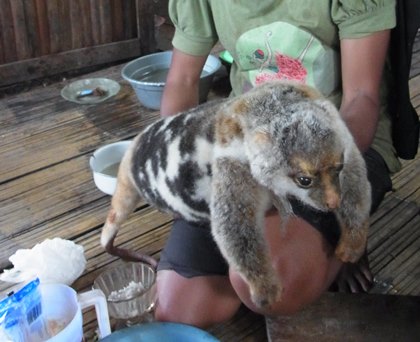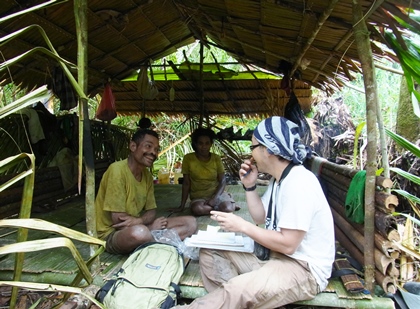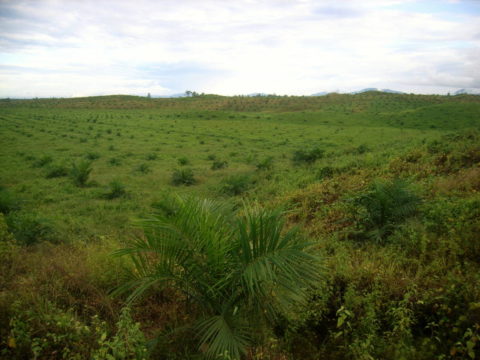Profile

- Research Subject
Environmental sociological studies on local utilization of wildlife in the tropics, resource management and conservation based on local ecological knowledge, and policy of forest resource management and biodiversity conservation. Area studies focusing on regional conflict and development issues in east Indonesia focusing on regional conflict and development issues in east Indonesia
- Research Fields
- Environmental sociology, Political Ecology, Indonesian Area Studies
- Faculty - Division / Research Group / Laboratory
- Division of Human Sciences / Research Group of Regional Science / Laboratory of Regional Science
- Graduate School - Division / Department / Laboratory
- Division of Human Sciences / Department of Regional Science / Laboratory of Regional Science
- School - Course / Laboratory
- Division of Humanities and Human Sciences / Course of Human Sciences / Laboratory of Regional Science
- Contact
Office/Lab: E402
TEL: +81-11-706-2303
FAX: +81-11-706-2303
Email: m.sasaoka(at)let.hokudai.ac.jp
Replace “(at)” with “@” when sending email.Foreign exchange students who want to be research students (including Japanese residents) should apply for the designated period in accordance with the “Research Student Application Guidelines”. Even if you send an email directly to the staff, there is no reply.- Related Links
Lab.letters


How can we achieve socially just conservation?
Tropical forests account for most of the world’s terrestrial biodiversity. As has happened in other tropical countries, the tropical forests of Indonesia have undergone rapid deforestation and forest degradation from the expansion of plantations for oil palms and industrial forestry. Deforestation and forest degradation have caused significant biodiversity losses. Many projects and policies have been implemented for the conservation of biodiversity and the protection of rare species. But rural people, especially those living in remote areas with little access to local markets, are sometimes highly dependent on protected wild animals for protein and supplemental income. Conservation projects and policies sometimes threaten the livelihood of these people.
Against the backdrop of globalized environmentalism, conservation efforts based on the Western concepts of ‘biodiversity’ and ‘sustainability’ come to have increasing effects on locally controlled natural resources. Such interventions are, in some cases, causing friction with local people’s resource management practices, which are based on local ecological knowledge.
I’d like to continue my field research in forest-dependent communities and explore how to overcome this friction, towards socially just conservation.


Put yourself where things happen, and get ideas for meaningful research questions!
There’s no ‘one-size-fits-all’ methodology for research in environmental sociology and related fields. For students who are starting environmental sociological field research projects, the most important things are for them to put themselves where things happen and to get ideas for meaningful research questions there. Then they can start to think about research methods. The formulation of research methods follows the setting of research objectives. The reverse is not true in place-based, problem-finding research. For such research, you may need to go beyond the borders of the discipline, and apply mixed methods to adequately address the research questions that arise at a field site.
Research on environmental sociology and regional research require interdisciplinary approaches. Hokkaido University, which offers a comprehensive range of disciplines, is home to a number of excellent researchers who present an array of perspectives from different backgrounds.
Message
Environmental sociology is a discipline aimed at studying the socio-environmental interactions in two contexts-the occurrence and resolution of environmental destruction as well as the realization of environmental coexistence, focusing on society. The destruction of environments (including natural and living environments) induces social injustice (including social issues such as social disparity, inequality and discrimination), and vice versa, which indicates that environmental destruction is the inseparable companion of social injustice. One major feature of environmental sociology is that it attempts to consider environmental issues in relation to social factors.

Environmental sociology—a field of sociology—deals with a wide range of topics. I am currently focusing my research on environmental governance which advocates the elimination of environmental destruction and human rights infringements in raw material-producing areas for global commodities.
Problem awareness behind research themes derives from topics discussed in academia in some cases, while in other cases it comes from actual issues with which people are confronted in the real world. This laboratory emphasizes visiting the very place where actual problems are occurring to develop problem awareness. I welcome those who are motivated to conduct field study to tackle actual socio-environmental problems.


